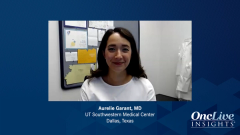
Scenario 1: A 47-Year-Old Man With Intermediate Risk Metastatic RCC
Expert perspectives on a patient scenario of intermediate risk metastatic renal cell carcinoma and corresponding management with combination immunotherapy.
Episodes in this series

Transcript:
Hans Hammers, MD, PhD:Hello, and welcome everybody to OncLive® Inside the Clinic. This program is titled “Optimizing Outcomes in Renal Cell Carcinoma: Translating Evidence to Clinical Practice.” I’m Dr Hans Hammers. I’m a professor of internal medicine and coleader of clinical research and immunotherapy of the kidney cancer program here at UT Southwestern Medical Center in Dallas, Texas. I’m joined today by my colleagues that I work with every day and really gets back to a lot on optimizing the care for my patients, Dr Margulis and Dr Garant. So I would like for you both to introduce yourselves. Dr Garant, would you like to go first?
Aurelie Garant, MD: Hi, everybody. I’m Dr Aurelie Garant. It’s a pleasure to be here. I’m one of the radiation oncologists at UT Southwestern and the director of brachytherapy as well.
Hans Hammers, MD, PhD:And Dr Margulis.
Vitaly Margulis, MD: Hi, there. I’m very glad to be here with you guys. My name is Vitaly Margulis and I’m a urologic oncologist at UT Southwestern and professor of urology here. Thank you very much for having me.
Hans Hammers, MD, PhD:Wonderful. So welcome and thank you for joining me. Today we are going to discuss recent advances in the treatment of renal cell carcinoma and the impact on clinical practice. We will present real-world patient cases and discuss our treatment approach to illustrate how we integrate recent data into practice to manage patients with renal cell carcinoma at our institution. So let’s get started with the first clinical case. This is actually a 47-year-old male in 2017, presented with gross hematuria. And he saw Dr Margulis first. He presented with a large left renal mass distended into the left renal vein, multiple liver lesions. The largest lesion measuring roughly 8 cm in the right liver lobe. He was sent to Dr Margulis initially for consideration of surgery but, rightly so, he biopsied and confirmed renal cell carcinoma and contacted medical oncology for management. So this is a patient who needed therapy within the first year. He didn’t really have dramatic lab abnormalities, but because of the need for treatment, he was essentially intermediate risk. He actually started nivolumab [Opdivo]/ipilimumab [Yervoy] before it was FDA-approved through an access program and got 2 doses of the combination immunotherapy 3 weeks apart. Unfortunately, around the time that he would get the third dose, he experienced significant creatinine elevation which was interpreted as nephritis and he was started on prednisone which led to a very quick normalization of his creatinine levels and started on a taper. Unfortunately, on the taper, we actually observed fairly high doses, consecutive increases in his creatinine which prompted us further and deeper immune suppression with mycophenolic acid. Despite that, he had follow-up scans and those demonstrated a deepened and reallyimpressive immunotherapy responses with decrease in the size of the hepatic metastases, as well as the renal cell mass, the lymphadenopathy, and essentially all the lesions that we knew of at the time. On the mycophenolic acid and the prednisone he developed worsening creatinine level. We actually had to further increase the dose of the mycophenolic acid and then eventually got his nephritis under control. But as you can see, it took us roughly 4 months to do that, and he was quite significantly immunocompromised and received only 2 doses of immune checkpoint inhibition. The next slide we have some more follow-up. In 2018, he essentially continued partial response with really resolution of liver metastases, but he had a renal mass that was smaller, but maintained with viable tissue by imaging studies. On imaging, there was really no other evidence for metastatic disease, with the exception of an L1 lesion, which turned sclerotic. He had a thyroid lesion, which was biopsied and essentially was benign. In June 2018, roughly a year later, doing really well on surgery, and somebody was 48 at the time, we decided to be aggressive and to surgically consolidate. So we went back to Dr Margulis, and together with a liver surgeon, they resected essentially all involved disease with pathology, really showing there was no residual cancer in any of the liver metastases areas that were resected and the small residual kidney cancer in the primary tumor and essentially has maintained NED [no evidence of disease]. He is going to return in a few months for another scan, but essentially, since 2017-18, no evidence for recurrence, just 2 doses of nivolumab/ipilimumab and doing well. So let’s discuss some of the pertinent things on the scan. First of all, Vitaly, you probably remember the case orally. What do you think when you hear this kind of case of this patient and how much advance we’ve made, I would say in the last few years in renal cell carcinoma management?
Vitaly Margulis, MD: I would say that presentation with a relatively widely metastatic disease in the era before we had effective systemic therapies, one could make an argument to go after his bulky primary tumor, but clearly, we now have treatments that are quite effective in controlling not only his local disease but also systemic disease now. I think he illustrates what I consider to be the magnificent success of [the] immunotherapeutic era. He had essentially a complete response, systemically and nearly complete response in his primary. And so I think, in terms of his management, I think we played our cards right. I think we led in with the most effective systemic therapy that we could have given him and consolidated him surgically, and he’s done very well.
Aurelie Garant, MD: At the time of his diagnosis, I think that the role for radiotherapy was not well established in the setting of hematuria. Back in 2017, we may have gotten consulted to try to relieve some of the hematuria to get him on systemic treatment if he was hemodynamically unstable. Since that time, we’ve had 2 published phase 2 trials in the radiation oncology community confirming efficacy of stereotactic ablative body radiotherapy to patients with limited sites of metastatic disease. And I think this will be addressed in some future cases. We’ll go into greater detail, but back in those days, I think there would’ve been a limited context for us to participate in the care, perhaps just with hematuria at the time.
Hans Hammers, MD, PhD:And he had a very nice deep response, essentially complete response in the metastatic disease sites, but there was some residual disease in the primary tumor. Is that something that you would expect and how does it compare to some of the data we are now observing when we deliver immunotherapy in patients with primary tumors?
Vitaly Margulis, MD: It’s interesting. I think the data is emerging, but my sense is that we are now seeing something in the neighborhood of 15% to 20% complete response rates in the primaries. And I think there are some radiographic parameters that can be used to almost predict a complete response. I don’t think we’re there. I don’t think we can reliably, at this point, say that in somebody who had a complete response systemically, that the primary can be left in place. But I think that is something that us and other groups are actively working on. I think that’s something in the future we can potentially predict.
Hans Hammers, MD, PhD:And then, to me, this case was kind of like the beginning of a change a little bit in practice. Because probably in the past, you would probably rarely have those patients return to you for consolidative surgery. Those patients probably would’ve just been on systemic therapy, just going along from 1 TKI [tyrosine kinase inhibitor] typically before the immunotherapy, or from 1 TKI to another TKI to another TKI. But probably rarely you would see those patients come back to you to then address the primary tumor, right?
Vitaly Margulis, MD: Yeah. I would say that in my practice not a single time. I don’t recall a single instance where somebody on single agent TKI has had a complete response systemically. And certainly, I haven’t had a case where there was a complete response in their primary. So I agree. I think we’re beginning to see those patients back with deep and durable responses
Hans Hammers, MD, PhD: Right.
Transcript edited for clarity.





































